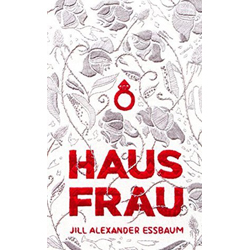 Published: 2015
Published: 2015
Author: Jill Alexander Essbaum
A great debut – stands alongside Madame Bovary and Anna Karenina

It’s not easy moving to another country, I only moved from Glasgow to Weymouth when I left home after university and it was a huge culture shock. It took me a while to get used to my new home. Even now, 15 years on, England is still a bit of a foreign country. My experience is absolutely nothing however compared to that of the flawed heroine of Jill Alexander Essbaum’s fabulous debut novel Hausfrau.
Anna Benz is an American woman living a comfortable middle class existence in a suburb of Zurich with her Swiss husband and three children. Her life should be perfect but Anna is unsatisfied with her life and indulges in a series of passionate but loveless extra marital affairs. As Anna spirals further and further out of control a number of tragic events threaten to destroy the world she has created for herself.
Anna isn’t a terribly likeable character but you’d have to have quite a hard heart not to feel a degree of sympathy for her predicament. Her husband is distant and seemingly impatient with Anna’s deep depression and need for a different life. She has no friends (partly because she refuses to let anyone get too close to her) and no life of her own in Switzerland, other than her language lessons and therapy sessions where she hides her true feelings. I’m not sure I’ve ever read a fictional depiction of depression which feels so honest and much of this comes from Essbaum’s own experiences of living in Switzerland and experiencing depression.
The book is full of contrasts which only seem to highlight the conflict within Anna. The genteel descriptions of Anna’s home life diverge wildly from the graphic (and loveless) sex scenes and further highlight how much damage Anna is unwittingly causing to herself. Hausfrau is compulsive reading, a story which looks beyond Anna’s life to wider issues of gender, marriage and loneliness. It makes the reader think not just about Anna’s life but their own and the lives of those around them. The ending is both shocking and understated – yet another of the contrasts that Essbaum favours.
There’s a long list of novels depicting women with dull, suburban lives who are unsatisfied in their marriages and Hausfrau fits into this list seamlessly. There are shades of Anna Karenina and Madame Bovary here but Hausfrau isn’t simply a modern day retelling of either of these stories, it stands proudly on its own as a rich and touching exploration of depression and solitude.
